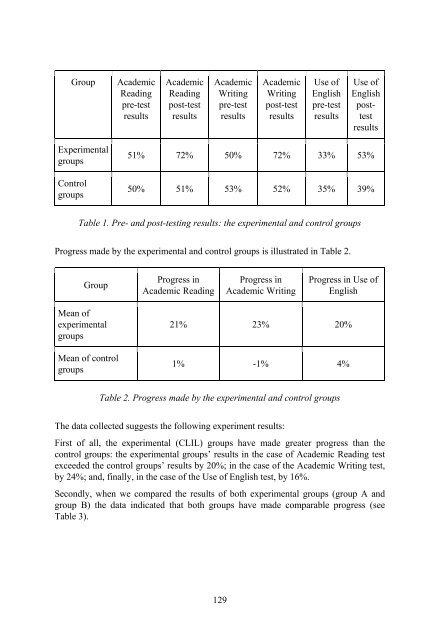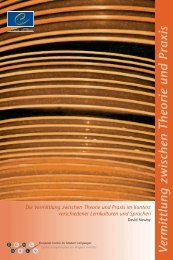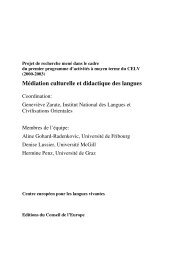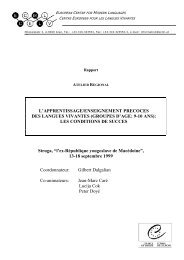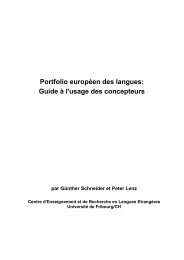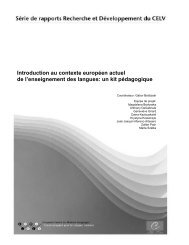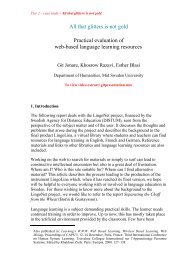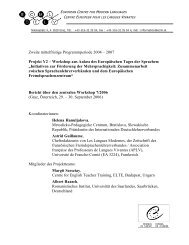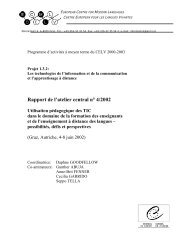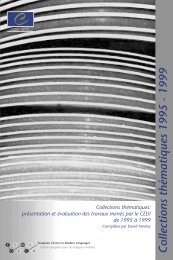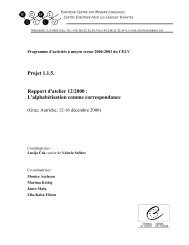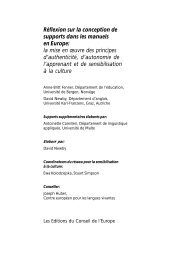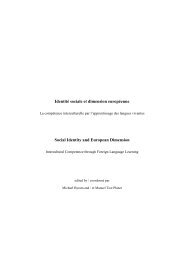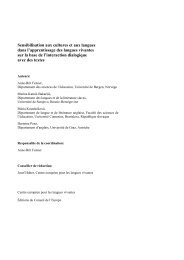- Page 1 and 2:
Languages for social cohesion Langu
- Page 3 and 4:
Languages for social cohesion: Lang
- Page 5:
This publication is dedicated to Ga
- Page 8 and 9:
10. The achievements of the “D”
- Page 10 and 11:
30. Expected contributions of ECML
- Page 12 and 13:
Section 4: this part of the publica
- Page 14 and 15:
Surmounting the language barrier re
- Page 16 and 17:
The ECML Conference 2007 The Confer
- Page 18 and 19:
the consultants of the ECML’s 200
- Page 20 and 21:
The White Paper should help us to m
- Page 22 and 23:
The European Charter for Regional o
- Page 24 and 25:
These include the specific contribu
- Page 26 and 27:
The European Portfolio for Student
- Page 28 and 29:
enjoying the benefits of scientific
- Page 30 and 31:
perspective of increasing and maint
- Page 32 and 33:
The European Union is founded on
- Page 34 and 35:
udget. However, such an attitude is
- Page 36 and 37:
GRIN, F. (1996), “The economics o
- Page 38 and 39:
Both of these, the broadly social a
- Page 40 and 41:
Second, because there are many mult
- Page 42 and 43:
Such work, addressing the cognitive
- Page 44 and 45:
stated that: “Children perceive a
- Page 46 and 47:
Practically, this would mean: wides
- Page 49 and 50:
Section 3: The contribution of the
- Page 51 and 52:
supporting those who speak them. On
- Page 53 and 54:
languages used; that minority langu
- Page 55 and 56:
8. The achievements of the “B”
- Page 57 and 58:
“identity”, “knowledge of lan
- Page 59 and 60:
interested in integrating the use o
- Page 61 and 62:
9. The achievements of the “C”
- Page 63 and 64:
distinct and separate competences
- Page 65:
Another project, GroupLead, looks i
- Page 68 and 69:
to determine if the tasks in the We
- Page 71 and 72:
Section 4: External experts’ cont
- Page 73 and 74:
one school. For small languages it
- Page 75 and 76:
the terms multilingual and multicul
- Page 77:
OTTERUP, T. (2004), “Sweden as mu
- Page 80 and 81: in Gaeltacht areas in the Republic
- Page 82 and 83: The objective here was to determine
- Page 84 and 85: Finally, we hope that in exploring
- Page 86 and 87: However, international evidence sho
- Page 88 and 89: “Watch me grow” appeared in the
- Page 91 and 92: 14. Teacher in-service training for
- Page 93 and 94: The background of teachers First th
- Page 95 and 96: as it is not connected to their mai
- Page 97: Nationality, national identificatio
- Page 100 and 101: language(s) and demonstrate meta-co
- Page 102 and 103: uilding aspect of the learning proc
- Page 104 and 105: ENGESTRÖM, Y. and MIDDLETON, D. (1
- Page 106 and 107: y the CEFR and incorporated a cross
- Page 108 and 109: neighbouring countries have similar
- Page 110 and 111: South African Currency American cur
- Page 113 and 114: Strand C: Professional development
- Page 115 and 116: Le contexte de l'enquête Le questi
- Page 117 and 118: un groupe par ailleurs globalement
- Page 119: CANDELIER, M. (2005), Cohésion soc
- Page 122 and 123: Deutsch als Fremdsprache - Schnuppe
- Page 124 and 125: Ein umfangreiches Repertoire an Kin
- Page 127 and 128: 19. Enhancing the effectiveness of
- Page 129: comparison/contrast essays can serv
- Page 133: HAMMANN, L.A. and STEVENS, R.J. (20
- Page 136 and 137: is the partner in charge of the mul
- Page 138 and 139: activities to the maximum, it is ne
- Page 140 and 141: The tools chosen for the course wer
- Page 142 and 143: Illustration 2. Screenshot of Flash
- Page 144 and 145: References BUCKINGHAM SHUN, S., MAR
- Page 146 and 147: placements abroad. Deficiencies in
- Page 148 and 149: There are information pages under e
- Page 150 and 151: CD-Rom: The final version of the CD
- Page 153 and 154: 23. Deux sites innovants pour l’a
- Page 155 and 156: Results of the 2004-2007 programme
- Page 157: on the ELP. CercleS is a partner in
- Page 160 and 161: Such a changing world necessitates
- Page 163 and 164: 26. Language teaching in a multilin
- Page 165: conferences, roundtables and worksh
- Page 168 and 169: As a teacher trainer I am particula
- Page 171 and 172: 28. Language education in a multili
- Page 173 and 174: Section 6: Preview of the 2008-2011
- Page 175 and 176: Short description of the projects 1
- Page 177 and 178: developing concepts of evaluation w
- Page 179 and 180: 30. Expected contributions of ECML
- Page 181 and 182:
enable teachers to help their pupil
- Page 183:
vision of an overall concept of lan
- Page 186 and 187:
Content and language education as a
- Page 188 and 189:
Content-based teaching + plurilingu
- Page 190 and 191:
The plurilingualism strand in the E
- Page 192 and 193:
well as through opportunities to ha
- Page 194 and 195:
attach particular importance to the
- Page 196 and 197:
Empirical Validation: check that th
- Page 198 and 199:
increased offer of languages at sec
- Page 201 and 202:
Section 7: Biographies of contribut
- Page 203 and 204:
De Renzis, Laura was born in Naples
- Page 205 and 206:
Marjut, Johansson is Professor at t
- Page 207:
Widlok, Beate studied Slavic and Ro
- Page 210 and 211:
Intercultural competence for profes
- Page 213 and 214:
Section 9: Projects of the third me
- Page 215 and 216:
Evaluation Continuity in language l
- Page 217 and 218:
Plurilingual education A framework
- Page 219:
Languages for social cohesion Langu


